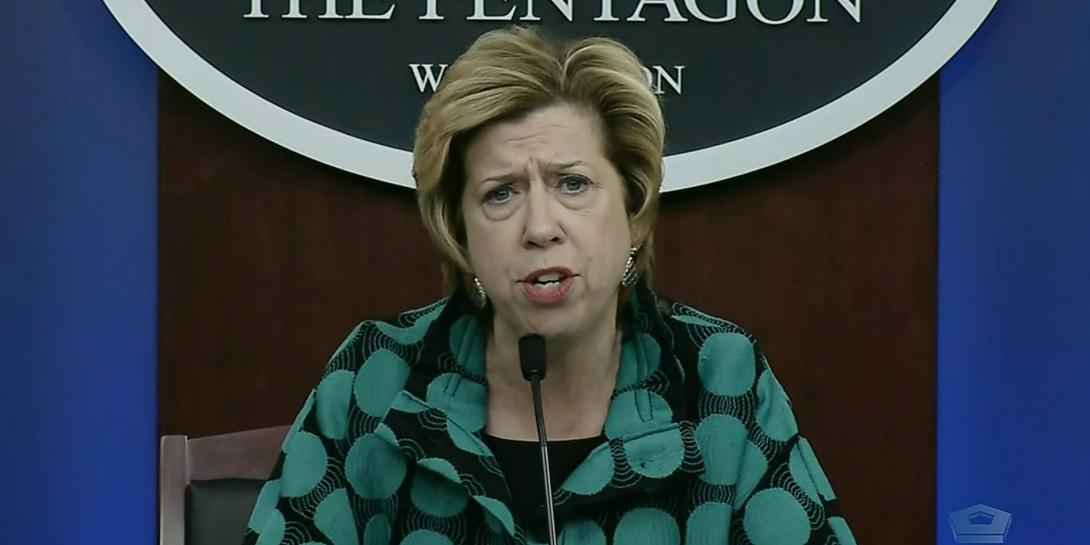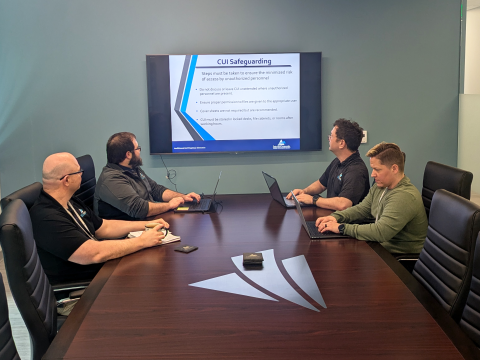Ellen Lord Warns of Economic Warfare During Pandemic
Ellen Lord, the U.S. undersecretary of defense for acquisition and sustainment suggested today that foreign adversaries may take advantage of the ongoing pandemic to conduct economic warfare against the United States, that industry could see a three-month “slow down” and that smaller businesses that provide critical components could suffer.
Lord made the comments during a press conference that streamed online.
Asked about the possibility the pandemic-induced economic downtown could result in more mergers and acquisitions (M&A), shrinking the industrial base, the undersecretary responded with a warning about economic warfare. “What I am concerned about is nefarious M&A practices. We’ve talked a lot with other nations, particularly in Europe, and we’ve seen a lot of shell companies coming in where the beneficial owner ends up being one of our adversaries. I’m particularly concerned about that,” she said.
She added the Defense Department officials are discussing possible legislative solutions with members of Congress “so that we have the statutory tools to intervene here,” she added. “I think we have to, regardless of the volume of M&A right now, we have to be very, very careful about the focused efforts some of our adversaries have to undergo economic warfare with us, which has been going on for some time.”
She also predicted a three-month slow down for the Department of Defense (DOD) industrial base. “We continue to assess the impact of a potential three-month slowdown to many programs due to COVID-19. … “I won’t discuss any program specifically, but we have seen inefficiencies across many programs. COVID-19 is temporarily shutting down defense manufacturing facilities and production lines, disrupting supply chains and distressing the financial stability of the companies DOD relies on to protect the nation,” she said.
She emphasized, however, that a slow down is not as severe as a delay. “I intentionally use the words ‘slow down’ and ‘impact,’ and I am not saying the word ‘delay,’ which carries a very different connotation.”
Because of illness or an inability to travel, some efforts, such as aircraft inspections, are not happening as quickly as expected, she elaborated. “So, we have somewhat of a slowdown in our ability to accomplish tasks,” she said. “We are finding workarounds for that versus just saying we’re delaying doing something. We do not look at delaying things. We are looking at working through the issues, which sometimes cannot be executed with the same efficiency we previously had.”
The three-month estimate, she said, is built on modeling and on real-time information gathered from industry. The models work, in part, by overlaying geographical information about COVID-19 outbreaks with major locations for industrial base companies.
The Defense Department and industry are working together to minimize any impacts, she added. “DOD continues to partner with industry to do everything possible to keep programs on schedule and to minimize the cost and schedule impacts. This is obviously a dynamic situation and the overall impacts are being assessed on an ongoing basis.”
Her biggest concern, she indicated, is for small businesses that provide critical parts. “Typically, the most problematic areas we have now are some of the smaller manufacturers who maybe from a dollar volume don’t do huge numbers but they are providing critical components across aircraft and naval applications. That’s where my biggest concern is, sort of the weakest link in the system. That’s where we’re really focused on trying to bolster.”
Smaller companies, of course, are likely to be the hardest hit. “I am concerned that some of the smaller companies may end up with some significant financial fragility, so … coming up with some ways that we think are pretty creative that we might bring capital providers together with companies who are working in the areas that are critical to the Department of Defense,” she reported. “We’re trying to develop these ecosystems to get those companies that have critical technologies and talent and facilities together with those investors … to help us through this.”
Lord praised prime contractors that have increased cash flow to small businesses to help them through the economic crisis. She singled out Lockheed Martin, which has publicly committed to speeding $450 million to its supply chain, focusing on distressed and small businesses that need it most.
“We have spoken with each of our major prime companies, and they have each confirmed their detailed plans to work with their supply chains to accelerate payments and to identify distressed companies and small businesses,” she reported.
She also commended the department’s Office of Small Business Programs for its support of small businesses. The office’s recent activities include webinars. One webinar covered foreign investment, including adversarial foreign investment, and the regulations in place to counter that, as well as the tools available to companies to protect themselves. Other webinars focused on available relief efforts and cybersecurity.
Lord recommended that companies reach out to the small business office for help if they need it. “We are working, obviously, to minimize impacts. We are engaging with industry and the [other agencies] to do everything we can to support the defense industrial base. We think we’re learning how to work in this new environment … .”




Comments